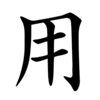用
| ||||||||
See also: 甩
Translingual
| Stroke order | |||
|---|---|---|---|
 | |||
Han character
用 (radical 101, 用+0, 5 strokes, cangjie input 月手 (BQ), four-corner 77220)
- Kangxi radical #101, ⽤.
Derived characters
- Index:Chinese radical/用
References
- KangXi: page 755, character 24
- Dai Kanwa Jiten: character 21703
- Dae Jaweon: page 1166, character 1
- Hanyu Da Zidian: volume 1, page 97, character 5
- Unihan data for U+7528
Chinese
| simp. and trad. |
用 | |
|---|---|---|
Glyph origin
| Historical forms of the character 用 | ||||||||
|---|---|---|---|---|---|---|---|---|
| Shang | Western Zhou | Spring and Autumn | Warring States | Shuowen Jiezi (compiled in Han) | Liushutong (compiled in Ming) | |||
| Oracle bone script | Bronze inscriptions | Bronze inscriptions | Bronze inscriptions | Chu Slip and silk script | Qin slip script | Ancient script | Small seal script | Transcribed ancient scripts |
 |
 |
 |
 |
 |
 |
 |
 |
 |
| Characters in the same phonetic series (用) (Zhengzhang, 2003) | |
|---|---|
| Old Chinese | |
| 通 | *l̥ʰoːŋ |
| 俑 | *l̥ʰoːŋ, *loŋʔ |
| 蓪 | *l̥ʰoːŋ |
| 桶 | *l̥ʰoːŋʔ, *l'oːŋʔ |
| 捅 | *l̥ʰoːŋʔ |
| 痛 | *l̥ʰoːŋs |
| 筩 | *l'oːŋ |
| 誦 | *ljoŋs |
| 傭 | *l̥ʰoŋ, *loŋ |
| 慵 | *ɦljoŋ |
| 鱅 | *ɦljoŋ, *loŋ |
| 滽 | *loŋ |
| 墉 | *loŋ |
| 鏞 | *loŋ |
| 鄘 | *loŋ |
| 槦 | *loŋ |
| 銿 | *loŋ |
| 甬 | *loŋʔ |
| 勇 | *loŋʔ |
| 涌 | *loŋʔ |
| 踊 | *loŋʔ |
| 蛹 | *loŋʔ |
| 恿 | *loŋʔ |
| 慂 | *loŋʔ |
| 悀 | *loŋʔ |
| 埇 | *loŋʔ |
| 踴 | *loŋʔ |
| 庸 | *loŋ |
| 用 | *loŋs |
| 佣 | *loŋs |
Etymology
From Proto-Sino-Tibetan *z(j)um ~ *zuŋ, provisionally set up by STEDT. Cognates to 傭 (OC loŋ) and 庸 (OC loŋ), outside Sinitic, Southern Bai zv³¹ (“to use”) Burmese သုံ (sum, “to use”), Ersu zi⁵⁵ (“to use”), Lahu yɛ̂ (“to use”), Pa'o Karen [script needed] (sūŋ, “to use”).
Sun, 1999 and Schuessler (2007) consider this word a cognate to Tibetan [script needed] (loŋs, “use”)
Pronunciation
Definitions
用
Synonyms
- (to use):
Compounds
Derived terms from 用
|
|
|
Japanese
Readings
References
|
- Source: EDICT and KANJIDIC files licensed by the Electronic Dictionaries Research Group.
Usage notes
Formerly used as man'yōgana for the back-vowel variant (甲類) of よ, romanized as yo1.
Noun
Suffix
用 (hiragana よう, rōmaji -yō)
- for the use of, for the purpose of
- 家庭用石鹸、散歩用のブーツ
- kateiyō sekken, sanpoyō no būtsu
- soap for household use, boots for [the purpose of] walking
- 家庭用石鹸、散歩用のブーツ
Korean
Vietnamese
This article is issued from Wiktionary. The text is licensed under Creative Commons - Attribution - Sharealike. Additional terms may apply for the media files.